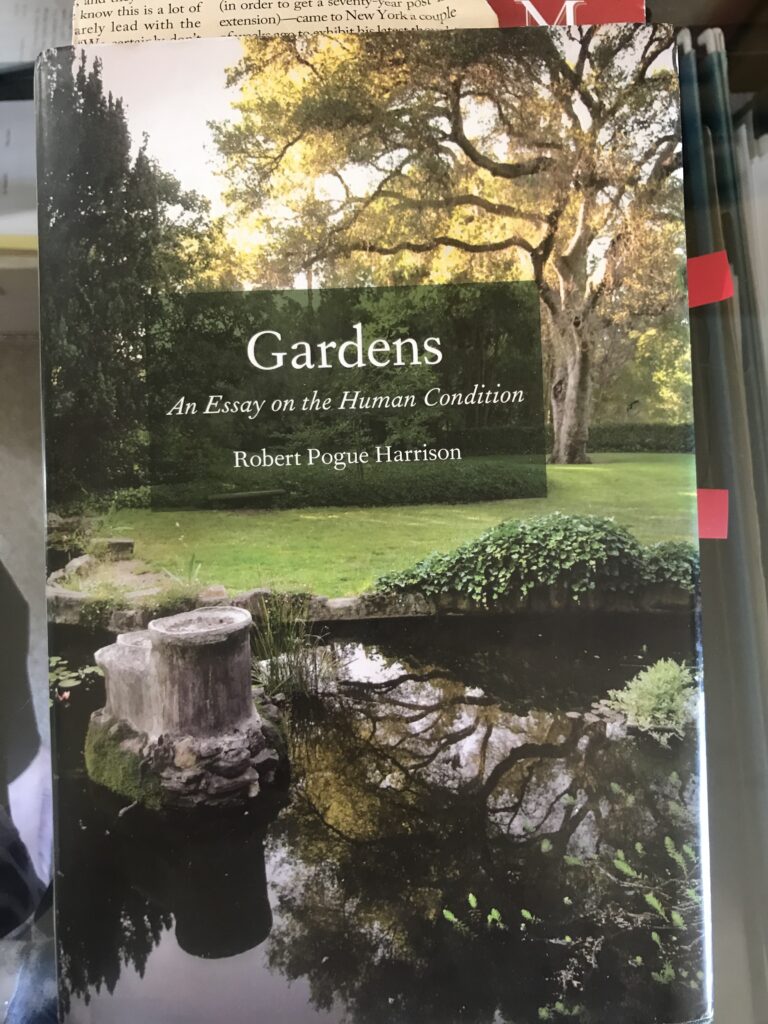
“WHAT IS ONE TO DO in so-called dark times, when the world that ‘comes between men’ no longer gives them a meaningful stage for their speech and actions, when reasoned discourse loses its suasion, when powerlessness rather than empowerment defines the citizen’s role in the public sphere?” Robert Pogue Harrison continues citing Plato’s withdrawal from Athens to found the Academy. He goes on in his wonderfully deep and insightful book, Gardens, An Essay on the Human Condition to discuss Epicurius and his founding of The Garden School. Literally in a garden, Epicurius cultivated Ataraxia, or peace of mind.
Far from gluttony and avarice, Epicurius cultivated patience, hope and gratitude. Harrison writes, “These are existential dispositions that we have all but exiled. We relate to the present in the mode of impatience, to the future in the mode of despair and the the past with the fool’s ingratitude. Where gratification takes the place of gratitude, as it does in our senile new world, gluttony becomes a destiny….A genuine hedonism puts every different demands on us from the ones that guide our behavior today. It demands of us that as gardeners of human happiness, we turn the curse of mortality into the source of many blessings.”
The book is more than an essay, in my mind. It is a deeply thoughtful contemplation of the responsibility to be a citizen of the world in the twenty-first century. Gardens play a metaphoric role in our nurturing nature and is a reflection of humanity. From agriculture to rose cultivation, the attention to our relationship with, rather than dominion over, the earth will guide our futures. Plural, because at this juncture, there are no isolated paradises to retreat to, no new worlds (on this planet) to start over, or rather take over, as those new worlds were old worlds to the indigenous inhabitants.
The author mentions Karol Čapek, author of The Gardener’s Year, (Čapek also coined the word “robots” in RUR) one of my favorite books. (Why isn’t it detailed in School of Scribes? I’ll correct this.) Harrison writes, “Gardening for Čapek is an education in the self-imparting generosity on which life in all its basic forms depends (and human culture is but one of these forms, albeit an expansive one.)”
As we are cultivating new horizons in our new pandemic world of self-isolation – more baking, house concerts, on-line galleries, cleaning and cultivating small gardens or countertop herb stations – this book, (not always easy for this uneducated reader in ancient history, medieval literature, Islamic culture) holds a treasure trove of ideas to ponder. What it means to be human, how can we truly cultivate our awareness of something throbbing under our feet? Something alive, larger than ourselves both individually and collectively, something incomprehensible, this life force that persists despite our best efforts to extract the biodiversity that seems to make It thrive. There is hope as our civilization realizes how precious and dependent we are on our spinning sphere. Read the book slowly. Then put it back on the bedside table and start over.
